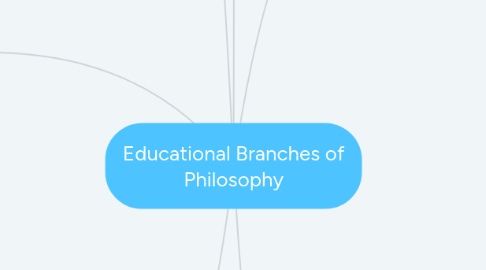Educational Branches of Philosophy
by Nichole Witt


1. Progressivism: "An educational philosophy emphasizing real-world problem solving and individual development (Kauchak & Eggen 157 & 161).
1.1. Educational Goal: Develop problem solving, decision making, and other life skills
1.2. Curriculum: Practice in problem solving and other life skills
1.3. Teaching Methods: Emphasizes applications in problem-based learning, cooperative learning, and guided discovery
1.4. Learning Environment: Democratic; collaborative; emphasis on learner responsibility
1.5. Assessment: Ongoing informal assessment
1.6. Notes: projects, problem-solving, topics of interest, real-world applicable, develop physically, intellectually, socially, and emotionally, teachers should question and guide discussions, John Dewey's work has more impact on American education than any other, classroom should be democratic, interest of the child is more important than the knowledge of the subject matter, 21st-century skills, technology taught for real-world applications, role of technology in ones life, and meaningful learning occurs when school experiences mirror real-world,
1.7. Based on: John Locke and Jacques Rousseau
1.8. Educators: John Dewey
2. Social Reconstructionism: "An educational philosophy asserting that schools, teachers, and students should take the lead in addressing social problems and improving society" (Kauchak & Eggen 158 & 161).
2.1. Educational Goal: Contribute to the creation of a just society
2.2. Curriculum: Social issues
2.3. Teaching Methods: Discussion; collaboration; student projects
2.4. Learning Environment: Model for equity and justice
2.5. Assessment: Examination of written products; informal observation
2.6. Notes: What is the purpose of schooling? schools should take lead in social problems and improve society, related to social justice, fair and equal treatment of groups, politically controversial, in need of restructuring, students critical to bring change,
2.7. Based on: Theodore Brameld influence by John Dewey
2.8. Educators: George Counts and Paulo Freire
3. Citations:
3.1. Errafaziramahdi . (2012, June 29). Perennialism Philosophies of education. Retrieved March 07, 2018, from https://www.slideshare.net/errafaziramahdi/perennialism-philosophies-of-educationi
3.2. Kauchak, D. P., & Eggen, P. D. (2017). Introduction to teaching: becoming a professional (5th ed.). Boston: Pearson.
3.3. Kaynat, H. (2016, November 09). Essentialism. Retrieved March 07, 2018, from Essentialism
3.4. Latriz, C. (2018). Reconstructionism. [online] Slideshare.net. Available at: Reconstructionism [Accessed 7 Mar. 2018].
3.5. Pappas, C. (2008, April 22). John Dewey's Educational Progressivism. Retrieved March 07, 2018, from John Dewey’s Educational Progressivism
4. My Philosophy: Progressivism with Social Reconstrutionism
4.1. My Philosophy: To obtain a challenging position as an intermediate or junior high teacher in which, I may utilize my skills, education, and enthusiasm to benefit the school district, students and myself.
4.2. Teaching not Lecturing
4.2.1. Small groups of all students
4.2.1.1. Manageable group work
4.2.1.2. Mentor
4.2.1.3. Peer reviews
4.2.1.4. Freedom to ask questions
4.2.2. Social Activities and practical applications
4.2.2.1. School resembles real life
4.2.3. The class operates like a team sport
4.2.3.1. Discipline
4.2.3.2. Students as players
4.2.3.3. Teacher as a coach
4.3. Management
4.3.1. Time
4.3.2. Curriculum
4.3.3. Resources
4.3.4. Discipline

